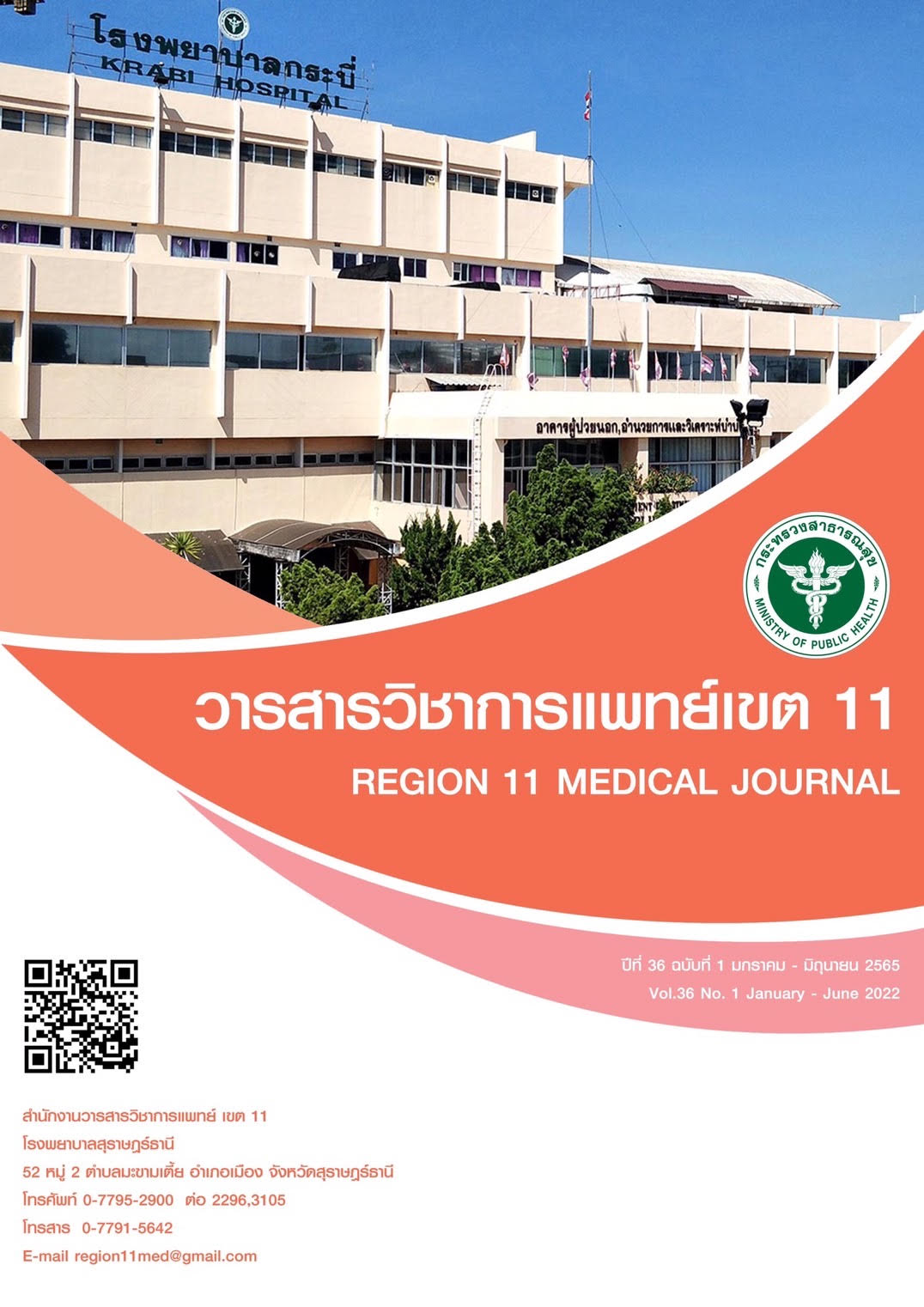The Effects of Home Quarantine’ Participation Model for Preventing and Controlling the Spread of Coronavirus Disease 2019 (COVID-19) in Surat Thani Province
Keywords:
Coronavirus Disease 2019, COVID-19, Home Quarantine, Participation spread preventionAbstract
Background: The Coronavirus Disease 2019 (COVID-19) pandemic has become a global hazard with devastating consequences in all sectors. Intense cooperation and collaboration are needed at all levels to reduce or stop transmission of the COVID-19 pandemic.
Objectives: This research aims to develop and assess the Home Quarantine’ Participation model in Surat Thani province.
Method: This participatory action research (PAR) conducted toward three steps, the first steps was developed Home Quarantine’ Participation model, 2nd step was applied home quarantine model in community by participation of health officer and health volunteer. In addition, the final step was assessed the outcomes by practice of health volunteer, transmission rate and outbreaks in community. Data analysis was utilized descriptive statistic and paired t-test This research was conducted between March, 2020 and February, 2021.
Results: The model of participation home quarantine to prevent the spread of COVID-19 included with these 4 categories 1.) quarantine’s strategy 2.) quarantine process which included with (1) registration system by “Save Surat Application” and integrated with “Surat Smart Healthcare Application” (2) quarantine assessment (3) the Infra-structure and equipment preparation (4.) communication acts 3.) quarantines activities and 4.) monitoring and evaluation process. This model illustrated the highly participation of community and research output assessment indicated high level knowledge and performance of preventing COVID-19 in quarantines was 97.08 percent. The very good level of facilities and quarantine care was 95.94 percent. The very good level of stress in quarantines was 1.35 percent. The satisfaction levels of quarantines in very good and good level were 51.41 percent and 42.76 percent. The outcomes of home quarantine model indicated the participation of quarantines which followed all of procedure by quarantined 14 days and participation of community in all operating guidelines. In addition, the research outcomes also indicated the best activity from community to quarantines and not offensive to them.
Conclusion: This research revealed that participation home quarantine was effective and preventing the spread of disease that could expand the model to other areas.
References
World Health Organization. WHO guidelines on management of injuries. Geneva: World Health Organization. 2015.
World Health Organization. Coronavirus disease 2019 (COVID-19) situation report-24. 2020. Retrieved from: https://www.who.int/docs/default-source/coronaviruse/situationreports/20200213-sitrep-24-covid-19.pdf?sfvrsn=9a7406a4_4. Accessed August 26, 2020. .
Zhang Y, Ma ZF. Impact of the COVID-19 pandemic on mental health and quality of life among local residents in Liaoning Province, China: A cross-sectional study. Int J Environ Res Public Health. 2020;17(7):2381.
World Health Organization. Naming the coronavirus disease (COVID-2019) and the virus that causes it. search form https://www.who.int/emergencies/diseases/novel-coronavirus2019/technicalguidance/naming-the-coronavirus-disease-(covid-2019)-and-the-virus-that-causes-it. 2020
Signorelli C, Scognamiglio T, Odone A. COVID-19 in Italy: impact of containment measures and prevalence estimates of infection in the general population. Acta biomedica: Atenei Parmensis. 2020;91(3-S):175-9.
Qiu Y, Chen X, Shi W. (2020). Impacts of social and economic factors on the transmission of coronavirus disease 2019 (COVID-19) in China. J Popul Econ. 2020;33:1127-1172.
กลุ่มภารกิจมาตรฐานการกักกัน (QUARANTINE) ศูนย์ปฏิบัติการภาวะฉุกเฉิน กรมควบคุมโรค. แนวทางบริหารจัดการสถานที่กักกันซึ่งทางราชการกําหนด (Quarantine). 2563;สืบค้นจาก https://ddc.moph.go.th/viralpneumonia/file/g_quarantine/g_quarantine_state210763n.pdf. สืบค้นเมื่อ 10 มีนาคม 2563.
กรมควบคุมโรค กระทรวงสาธารณสุข. ข้อมูลเกี่ยวกับโรคติดเชื้อไวรัสโคโรนา 2019 (COVID-19)..2563. สืบค้นจาก https://ddc.moph.go.th/viralpneumonia/index.php สืบค้นเมื่อ 12 กุมภาพันธ์ 2563.
กรมควบคุมโรค กระทรวงสาธารณสุข. รายงานสถานการณ์โรคติดเชื้อไวรัสโคโรนา 2019. 2563. สืบค้นจาก https://ddc.moph.go.th/viralpneumonia/situation.php. สืบค้นเมื่อ 30 เมษายน 2563.
สํานักเลขาธิการคณะรัฐมนตรี. ประกาศเรื่อง การเตรียมความพร้อมป้องกันและควบคุมการระบาดของโรคติดเชื้อไวรัสโคโรนา 2019. 2563. สืบค้นจาก http://soc.soc.go.th/slkupload/v63_89.pdf. สืบค้นเมื่อ 20 มีนาคม 2563.
Liu W, Zhang QI, Chen J, Xiang R, Song H, Shu S, Chen L, Liang L, Zhou J, You L, Wu P. Detection of Covid-19 in children in early January 2020 in Wuhan, China. New England Journal of Medicine. 2020 Apr 2;382(14):1370-1.
Viner RM, Russell SJ, Croker H, Packer J, Ward J, Stansfield C, Mytton O, Bonell C, Booy R. School closure and management practices during coronavirus outbreaks including COVID-19: a rapid systematic review. The Lancet Child & Adolescent Health. 2020 May 1;4(5):397-404.
Chu DK, Akl EA, Duda S, et al. Physical distancing, face masks, and eye protection to prevent person-to-person transmission of SARS-CoV-2 and COVID-19: a systematic review and meta-analysis. Lancet. 2020;395(10242):1973-87.
ธีรพัฒน์ อังศุชวาล. กลไกการอภิบาลทางสาธารณสุขของไทยในการจัดการโควิด-19.วารสารสังคมศาสตร์ มหาวิทยาลัยนเรศวร. 2563;16(2).37-75
พระครูศรีปริยัติวิธาน, ดร. ความคิดเห็นของประชาชนต่อการป้องกันและรักษาโรคติดเชื้อโควิด-19 ตามหลักอริยสัจ 4. วารสารศิลปการจัดการ. 2563; 4(3).520-536.
Ahmad N, Ahmad W, Arman R, et al. Community perception survey – COVID 19 knowledge, attitude and practice survey in Kabul, Kunduz and Khost provinces. Retrieved from: https://www.humanitarianresponse.info/sites/www.humanitarianresponse.info/files/assessments/afg_community_perception_survey_covid-19_final_report_johanniter_20042020.pdf. Accessed March 24, 2020.
ปกรณ์ชัย สุพัฒน์พงศธร. วิถีการผลิตกับความมั่นคงของชีวิตจังหวัดศรีสะเกษ. วารสารมนุษยศาสตร์และสังคมศาสตร์ มหาวิทยาลัยมหาสารคาม 2559; 35(2):107-120
Bavel JJV, Baicker K, Boggio PS, et al. Using social and behavioural science to support COVID-19 pandemic response. Nat Hum Behav. 2020;4(5):460-471.
คณะเศรษฐศาสตร์ จุฬาลงกรณ์มหาวิทยาลัย. Behavioral Insights ของครัวเรือนไทยภายใต้สถานการณ์ COVID-19: ภายใต้การสนับสนุนของสํานักงานคณะกรรมการส่งเสริมวิทยาศาสตร์วิจัยและนวัตกรรม (สกสว.) และสถาบันวิจัยระบบสาธารณสุข (สวรส.). 2563. สืบค้นจาก:https://drive.google.com/file/d/1s-tvSan9LHnDWbfbs4t8vIeqWAJw4ekj/view. สืบค้นเมื่อ 12 เมษายน 2563.
Downloads
Published
How to Cite
Issue
Section
License
Copyright (c) 2022 Region11Medical Journal

This work is licensed under a Creative Commons Attribution-NonCommercial-NoDerivatives 4.0 International License.






